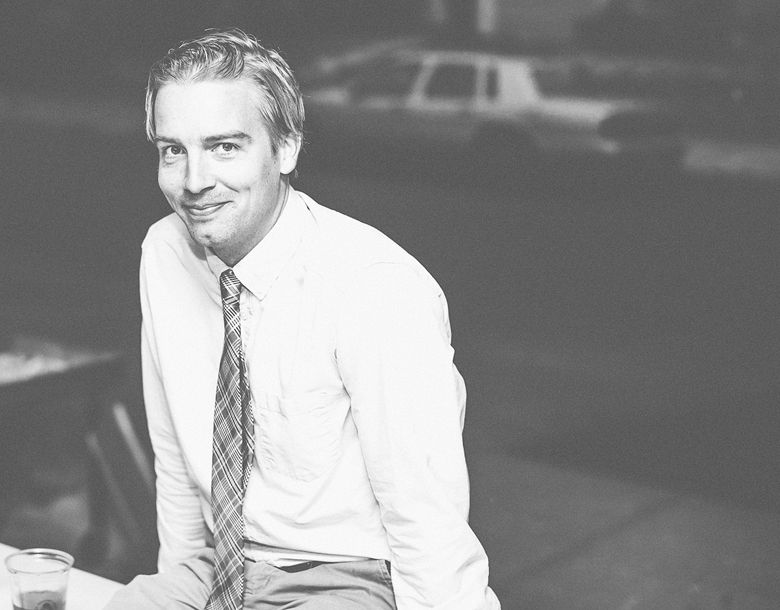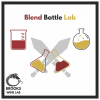Turning The Tables X
Interviewing the interviewers: Mark Stock

ABOUT THIS COLUMN: This Q&A was conducted by Carl Giavanti and modeled on the Wine Industry Network Advisor series, flips the script on wine writers by asking them about their own profession.
Mark Stock is a wine writer formally trained in journalism and shaped in the cellars and tasting rooms of the Willamette Valley. He’s spent more than fifteen years in the trade, stuck on the Kool-Aid he drank during his first harvest in 2006. He writes for a numerous national and regional outlets, including The Manual, SevenFifty Daily, Travel Oregon, Vinepair, Sip Northwest and more. He offers a compelling voice for a number of winery brands and trade organizations as well as creative copy for select restaurant groups and travel sites. You can learn more at markastock.com, a website he pledges to one day update again.
Professional Background
How did you choose wine, and wine writing?
MS: Like so many in the Willamette Valley at the time, I stumbled into it. I needed a job out of college and biked up to Cooper Mountain in August of 2006 to see if they needed any help. I was doing the cellar rat thing two weeks later. Wine writing came much later, after having some experience with the stuff, including almost a decade at Vista Hills Vineyard (now Domaine de Broglie). Having studied journalism, I always wanted to tie in the writing side. I just wasn’t clever enough to make a full-time go of it until 2016. And frankly, I still write about other things too in order to keep the boat afloat.
What are your primary story interests?
MS: Characters. It’s a cliché but a worthy one. A good personality can practically write a great story for you, if you listen; more crucially, stories that ought to be told. As Jon Bonné wrote, there are way too many fans in wine writing and not enough reporters. Getting the sample and writing about it is fun, and I’ve done plenty of that (perhaps to a fault). But the journalist in me has always tried to sniff out the bigger issues, even if they never get published. All of the themes we’re finally waking up to – the environment, social justice, equity – pertain to wine too. If I were a better scribe, you’d see more of that beneath my byline.
Are you a staff columnist or freelance? What are the advantages of both?
MS: Presently, I’m mostly freelance but have certainly gone the columnist route. The obvious advantage with the latter is consistent work, provided the outlet is surviving. Freelance offers a ton of freedom, which can be a blessing and a curse. Sometimes, I’d like to give up the rollercoaster ride for a spot on the conveyor belt – aka, a fully-benefited role. Any wine writer will tell you that’s a rarity. Hence, the fact why my work often strays from wine.
Is it possible to make a living as a wine writer today? If so, how have you succeeded? If not, why not? What are the primary challenges and hurdles you face?
MS: I’m not sure. I suppose if you landed at Wine Spectator or Food & Wine, the chances are good. Or, if you’re able to turn out some quality and timely books like my pal Katherine Cole. I suppose you could also build a large enough following through the many related social avenues to be a genuine influencer and wield that power to the bank, but that sounds like torture to me. I know a lot of fellow writers who’ve simply given up the hustle for the comfort of a sturdy PR or marketing gig.
I’ve succeeded by being a chameleon in terms of the types of assignments I write as well as the kind of subject matter. I’ve also tried to adapt to the media climate. Sometimes that means writing advertorials or copywriting for a company you don’t know as much as you might like. The light at the end of the tunnel is always this: Turns out, not everybody can write. In fact, many are terrible at it; I just happen to be a little better than average. And that in itself is a weapon people will pay you to use.
Personal Background
What would people be surprised to know about you?
MS: I’m pretty afraid of claymation.
What’s the story - how did you decide to live and write in Oregon?
MS: I was born and raised in the ‘burbs (Tigard). I’ve gone away multiple times and probably will again, but I seem to always come crawling back.
What’s the best story you have written?
MS: I wrote a story about my favorite river for The Drake Magazine a couple of years back and, as a genuine love letter of sorts, it’s probably my favorite and maybe my best-written. Good luck finding a link, though; I think it just went to print. My best wine piece of late might be one titled Can ‘Do-Nothing Farming’ Produce Quality Wine? for SevenFifty Daily. Tai-Ran Niew was one of the best interviews in memory, and I learned a ton in the process.
If you weren’t writing about wine for a living, what would you be doing?
MS: Who knows? Splitting shifts at a bunch of restaurants, probably. Or grossly extending my stay in school so as to continue avoiding the very question. In another life, I’d love to be a woodworker. Or a National Park ranger. Or a sea lion.
Writing Process
Can you describe your approach to wine writing?
MS: It’s surprisingly similar to selling wine in the tasting room, something I did for years. The bait has got to be more than just the wine. People covet context and personalization. I try to inject a healthy dose of that into my writing.
What are you working on now (for your own site, or which other outlets/publications)?
MS: I have my usual stable of outlets (The Manual, Sip Northwest, SevenFifty Daily, etc.), and also do some brand writing for a handful of trade organizations and producers. I am always sniffing out new projects; so we’ll see. I do think the great American wine novel is still yet to be written, although there have been some quality efforts. I think about that a lot and would love to take a stab at it in earnest someday.
Working Relationships
What are your recommendations to wineries when interacting with journalists?
MS: Come at us neutrally. We’re not here to do your bidding, nor are we coming at you with a fiery stake raised. At least that’s what the idealistic writer in me would say. And keep it simple. I’m not as wined and dined as a lot of wine writers (and perhaps I’m too old now to be wowed by it anymore), but I’d rather talk about the time you hired a falconer as we wander through a muddy vineyard than be greeted with the hoodie and the logoed wine key.
But that goes both ways. Wineries need to be protected to some extent too. Exhibit A: Don’t expect a winemaker to give you in-depth responses mid-harvest. It works out best when both sides do at least a little bit of homework upfront. Writers, research your wine subjects. Wineries, know a bit about the audience you’re potentially speaking to.
What advantages are there in working directly with winery publicists?
MS: There are several. Publicists tend to be very responsive and have instant access to lots of useful context, like production info or tech specs on the wines. The best ones can even pitch you a worthwhile story idea you’ll pursue instead of instantly delete. Yet, sometimes you need content straight from the horse’s mouth, whether that horse is the owner, winemaker or grower.
What frustrates you most about working on winery stories and/or wine reviews?
MS: One could write a book about this. I’ll refrain from a rant – and again, I’m no saint – but I wish there was more objectivity. There’s so much pay to play and glad-handing, especially when it comes to reviews. It’s frustrating that so many writers are stretched thin; you see it everywhere. The sports writer that’s now covering the environment too thanks to budget cuts. We’re being asked to do more for the same amount of pay, sometimes less. Precariously, some of that “more” tends to include covering things beyond our comfort zones. This is a big reason why people often complain about modern-day reviews and expert opinions.
People are often surprised that I worked at a winery for almost a decade and logged many hours in the cellar as an assistant winemaker. It’s a definite advantage, as I can usually write from experience, or some semblance of familiarity. It allows me to write the 101-type articles for general outlets, as well as the geekier ones for trade organizations, etc. I encourage every wine writer to work at least one harvest at some point; it’s all kinds of beneficial. Plus, you’ll probably get really good at driving a forklift.
I realize that my spirit self is probably from a century ago (you know, the chain-smoking reporter with a fedora that has a press tag on it). I’m nostalgic for longform writing and should probably just get with the times. But not without some grumbling.
Which wine personalities would you most like to meet and taste with (living or dead)?
MS: CJ McCollum. Fellow journalist, wine admirer, and holder of a sweet pull-up jumper.
Leisure Time
If you take days off, how do you spend them?
MS: I’m fortunate enough to have a very flexible schedule, although where there’s an internet connection there’s always the temptation to work. That said, I like to turn it all off and go fly-fishing, watch some European soccer or simply observe the many hilarious and unprompted things my little kids do. I’d like to play more Scrabble with my wife, going forward.
What is your most memorable wine or wine tasting experience?
MS: It’s hard to pick one. I’ve been treated to everything from living room tastings and goat-petting (Antiquum Farm) to a magical Syrah poured into a to-go cup as the owner walked us through the Martian landscape of their vineyard (Delmas). I might give the gold medal to a couple of friends I had in college who, at least occasionally, steered me away from cheap suds toward Dundee Hills Pinot Noir. They had family in the wine world, and every now again, while the room was downing Keystone Light, we’d try a 2001 Pinot. Even then, I got a sense that wine was something more than what Dad cooked with (from the box). I’d like to think I was on to something, but I’m still figuring that part out.
What’s your cure for a wine hangover?
MS: Haven’t you taken the OLCC test? The only cure is time. Not even hot coffee or a cold shower will do the trick. Honestly, I find a good playlist will at least help the cause (I’m pretty sure the Hawaiian band Kalapana was engineered for this very task). A fried chicken sandwich doesn’t hurt, the fast food-ier, the better.
What’s your favorite wine region in the world?
MS: It’s an ever-changing thing, but right now I’m pretty addicted to the extremes of Italy. I’m in love with volcanic wines from Etna and Sicily but admittedly having a simultaneous affair with the mountainous wines of the north from Alto Adige.










